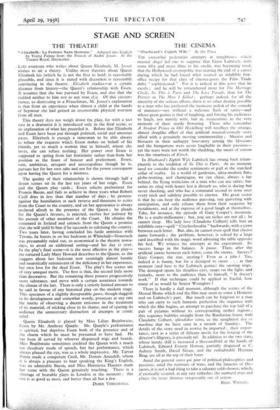THE CINEMA
• • illuebeard's Eighth Wife." At the Plaza
THE somewhat pedestrian attempts at naughtiness which marred Angel led one to suppose that Ernst Lubitsch, with some fifty and more films to his credit, was becoming tired, that the Hollywood cosmopolite was nearing the end of a career during which he had found what seemed an infallible box- office recipe for that class of cinema-goers the Film Trade dubs "sophisticated." For it is indeed at this genre that he excels ; and he will be remembered more for The Marriage Circle, So This is Paris and The Love Parade, than for The Patriot or The Man I Killed ; perhaps indeed, for all the sincerity of the serious efforts, there is no other destiny possible to a man who has perfected the insincere polish of the comedy of manners—not without a welcome flash of satire—and whose great genius is that of laughing, and forcing his audiences to laugh, not merely with, but at, insincerities in the very moment of their sterile flowering. Those who remember A Student Prince in Old Heidelberg will recollect the strange, almost druglike effect of that artificial musical-comedy story allied with a genuinely moving sentimentality ; Shearer and Novarro in their unhappy love-story among the blossoms and the biergartens were never laughable in their passions— yet the tears were not worth the shedding, the smart of sorrow was the smartness of Kitsch.
In Bluebeard's Eighth Wife Lubitsch has swung back trium- phantly to the tradition of So This is Paris. At no moment need we consider the tender sentiments or pull at the starched collar of reality. In a world of gardenias, ultra-modern flats, globe-trotting, and champagne, we can chase, always a lap behind, the flying witticisms of a man who can use satire, but satins its sting with honey lest it disturb us, who is daring but never shocking, and who has a command second to none over every trick and subtlety possible to cinema. His great secret is that he can keep the audience guessing, nay quivering with anticipation, and only release them from their suspense by instalments, and at the expense of a good laugh at themselves. Take, for instance, the episode of Gary Cooper's insomnia. He is a multi-millionaire ; but, you see riches are not all ; he cannot sleep. His lady love (Claudette Colbert) tells him an infallible cure—spell " Czechoslovakia "backwards, with a yawn between each letter. But, alas, he cannot even spell that elusive name forwards ; the problem, however, is solved by a large card inscribed with the magic word adorning the table opposite his bed. We witness his attempts at the experiment. Its success hangs in the balance. A pause. Then, after the artificial yawns between each letter, come the snores. Snores ? Gary Cooper, the star, snoring ? Even as a joke ? Yes, indeed it is funny, but for a demigod to snore . . . at that moment (and here is the Lubitsch genius) the snoring stops. The demigod opens his sleepless eyes, snaps on the light, and remarks, more to the audience than to himself, "It doesn't work." If that technique could be applied to Euclid, how many of us would be Senior Wranglers ?
There is hardly a dull moment, although the scenes of the Mental Home which end the film may seem to some a Homeric nod on Lubitsch's part. But much can be forgiven to a man who can carry to such fantastic perfection the sequence with which the film begins, an attempt to purchase the top half of a pair of pyjamas without its corresponding nether regions ; this sequence bubbles straight from the Bandusian fount, with Claudette Colbert, splendidior vitro, as the naughtiest dea ex machina that we have seen in a month of Sundays. The details of the story need in nowise be imparted ; their impor- tance, save as a series of delicate anvils for the forging of the director's filigrees, is precisely nil. In addition to the two stars, whose innate skill is increased a thousandfold at the hands of Lubitsch, Edward Everett Horton, partially disguised as C. Aubrey Smith, David Niven, and the redoubtable Herman Bing, are all at the top of their form.
Amid the general sauve qui pew of political philosophies and passions, amid the rumours of wars, and the lunacies of Dic- tators, it is not a bad thing to take a salutary cold-shower, which, if exotically scented, at any rate refreshes the outward man and places the inncr demons temporarily out of action.
BASIL WRIGHT.


























































 Previous page
Previous page